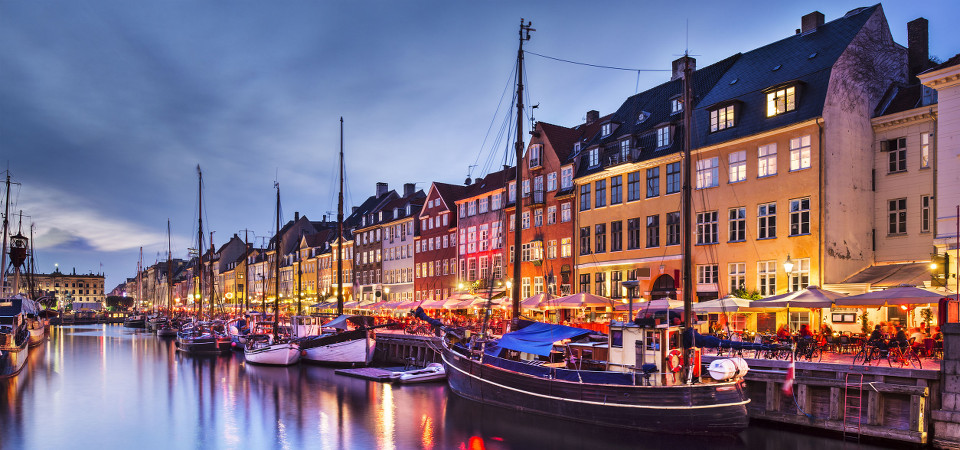Copenhagen-based Sharing.Lab uses technology to foster in-person interactions among urban residents. (Park Inn Blog)
The current, technology-driven incarnation of the sharing economy in Denmark draws on the country's long tradition of cooperativism, dating back at least to its transition (c. 1800) from grain to cattle and dairy farming. Besides agricultural cooperatives, cooperative stores, cooperatively-owned windmills, communes, and co-housing proliferated into the early twentieth century.
The research and project consortium Sharing.Lab aims to re-introduce the sharing spirit to Danish cities by using technology to foster in-person interactions. Sharing.Lab's unique approach focuses on how small physical objects located in public spaces can serve as conversation starters and relationship-builders.
I recently corresponded with Sharing.Lab communications head Signe Kassow over email. Kassow, a Copenhagen-based editor, strategist, and content creator, outlined Sharing.Lab's philosophy and described a couple of ongoing projects. She also spoke to the "political vacuum" vis a vis sharing in Denmark, and indicated the potential of the sharing economy to render the public sector more efficient and effective.
Anna Bergren Miller: When and why was Sharing.Lab founded? Please briefly describe its mission.
Signe Kassow: We launched sharinglab.dk in the beginning of 2015. We are a non-profit organization based in Copenhagen. We research and experiment with how sharing can empower urban communities. Sharing.Lab curates, produces, and shares knowledge on how to apply sharing on theoretical and practical levels.
We want to help policy makers develop citizen-centric solutions that can start conversations among likeminded people in the public spaces surrounding us. So we research knowledge on how to build solutions that can connect us with the friends we haven't met yet, the mechanisms that make us share, and incentives for becoming part of a community.
We hope that policymakers will visit our knowledge platform and learn the societal potential of sharing and how they can develop a public governance structure to [reduce] the many barriers in the outdated regulations of today.
Tell me about one or more projects in which Sharing.Lab is currently involved.
Our first project solution is OurHub. It's a technology platform that makes it easy to have shared experiences in public space. It consists of a sharing box located in places such as a park, with built-in hardware technology that makes it possible to use your smartphone to access the objects, and to track each object.
On top of that we are building a social platform that can connect [you with the] people surrounding you. It's a digital connection platform for offline meetings centered around social objects.

Sharing.Lab's OurHub combines a mobile platform with "smart" objects to bring people together in urban spaces. (OurHub)
Why is sharing important? And how can sharing benefit urban communities,
specifically?
Most of the so-called sharing economy services have nothing to do with the sharing economy. Many are based on classical consumer-centric business models. It's all about solving tangible needs: an apartment when you travel, a car or taxi service that can bring you from Point A to Point B, or access to a cheap handyman when you need to get something fixed—all packaged in great user experiences. And that's fine.
We believe that we can take that much further. What we are offering is real offline human connectedness, by turning small objects into social objects. It is not the specific objects that are important, but their ability to start conversations with your local peers. We place the objects in public third spaces, in boxes you can access with your smartphone, giving citizens an opportunity to interact with each other.
We are especially interested in [the fact that] technology has made us hyperconnected to each other, yet we see an increase in loneliness. Especially in cities. The paradox is that the more people you are surrounded by, the easier it is to be lonely. Real face-to-face personal interactions have drastically fallen over the last 20 years, and according to the American psychologist Sherry Turkle we are even lonely when we are together. She calls it "connected loneliness." Our goal is to improve urban life, and to try to eradicate loneliness and segregation by researching and developing sharing tools for conversation starters in public spaces.
How has Sharing.Lab attempted to draw on earlier cooperative efforts in
Denmark?
We want to build a community ownership business model inspired by the Danish co-op movement. In Denmark we have a strong tradition for co-ops, and have been building companies based on that business model since 1866.

Hjedding Cooperative Dairy, founded 1882. (Kulturarv.dk)
What else would you like me to know about Sharing.Lab, or about sharing more generally?
Right now there is a huge political vacuum. It is about a lack of understanding, a lack of perspective on how citizen-centric sharing can do good things for society, and [that] it’s also an
opportunity to strengthen the economy. For example, if we replaced the public central kitchens run by the government with local food sharing services, we would be able to save a lot of
money, give patients a better service, and strengthen the local community.
It is how we solve this puzzle that is really interesting to us, and it would be great to collaborate with city planners and forward-thinking cities on this. Citizen-centric sharing can be used to create a more efficient public sector, which for less money can create better services. However, it requires an investment in establishing the necessary regulations and financing models. This is where we would like to help with our network and knowledge on citizen-centric sharing.

Denmark's DagliBrusen grocery stores are operated by the FDB, or Danish Consumers Cooperative Society. (Eysink Smeets)









